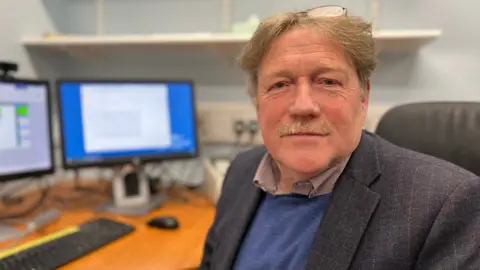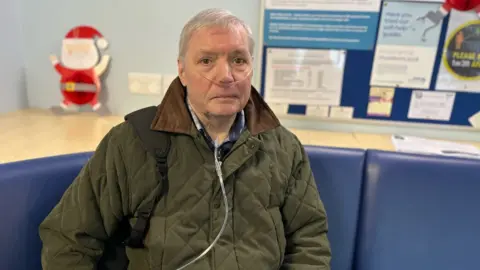Scottish GP numbers drop and fewer working full-time
 BBC
BBCThe number of GPs in Scotland has seen a slight decrease in the past year, the latest figures show.
Public Health Scotland statistics show there has been a drop of 23 fully-qualified GPs. On top of that, more doctors are working part-time hours.
However, there was an increase of 55 GP trainees, which made the overall total headcount slightly more than last year.
The Scottish government said it expected numbers to increase at a greater rate in the next five years.
The latest figures show there are 5,209 GPs in Scotland, including GP trainees, up 32 on last year.
However, if trainees are excluded the number is 4,515, down on the 2021 figure.
A separate report estimated the "whole time equivalent" number is 3,494, down 3% on the 2021 figure.
A recent report said the reduction in WTE is likely to be the result of an increase in female GPs who are more likely to work part-time.
Women now make up 62% of the GP workforce in Scotland.

GP services are changing significantly in the face of staff shortages and struggles to meet demand. It has been happening for a while.
There has been a decrease in the number of GP practices - down 9% since 2012, with 11 closing in the past year alone.
Meanwhile the numbers of patients over 65, who need more medical care, has gone up 20% in the past decade.
Efforts are being made to train new GPs but the fear is that even if targets are met, it won't be enough.
There's also been an expansion of general practice teams so you are more likely to see an advanced nurse practitioner, pharmacist or physiotherapist than a GP - but it's been hard to recruit them too.
For patients that can mean people having to travel further to bigger medical centres.
I visited a surgery in Scone had that 30 years ago had 6000 patients. Now it has 17,000.
In other cases, health boards step in and try to find staff to run the service locally.
Doctors say the move to bigger, more centralised services is not good for patients who lose the continuity of care.
It increases the risk that things will be missed or there will be more referrals to hospitals which are already stretched.

Unmanageable workload
Meanwhile, a new report from the Royal College of General Practitioners in Scotland (RCGPS) has warned Scotland could face a shortage of 1,500 GPs within the next five years.
It said the lack of a long-term strategy to recruit more GPs and retain the existing workforce was leading to an unmanageable workload.
The RCGPS annual survey of members found 36% said they would be unlikely to be working in general practice in five years time, with many saying they planned to retire.
Increasing numbers said they would leave because it was too stressful.
The royal college wants the government and health boards to offer more support to family doctors to help cope with increased demand.

The Scone surgery in Perthshire has had to take on more patients as other practices have closed.
James Mowbrey, who has the chronic lung disease IPF, told BBC Scotland that sometimes he has to make more than 20 phone calls to get through.
He said there have been times when he had put the phone down in "exasperation".
Dr David Shackles, who has worked at that practice for 29 years, said there were not enough GPs.
"We know that the whole time equivalent numbers have dropped by about 3%," he said.
"Headcount is often meaningless. It is how many GPs you have got working in the surgeries day-in day-out and how many you have got in the out of hours service.
"Our GPs are working incredibly hard 24/7. It is not just in-hour services."
Dr Shackles, who is joint chair RCGP Scotland, said there were shortages in other services linked to general practice such as pharmacists and district nurses.
He said new innovations such as Hospital at Home often took away staff from other core services.
Retention model
Dr Shackles said it takes 10 years to train a GP from when they begin medical school.
"We have not got 10 years," he said. "So we have to look at an alternative and that is a retention model.
"We know many GPs are retiring early because of the pressures but we are also losing people earlier in their career for the same reason.
"For some it is pressure or frustration but some people are moving abroad. We have got to do something to bring the joy back into general practice."Health Secretary Humza Yousaf praised the work of GP at a time of significant challenge in the NHS.
He said the latest workforce figures showed good progress towards the commitment to increase the number of GPs by 800 by 2027.
Mr Yousaf said additional places at medical school would mean more GPs would begin to feed through in the next few years.
He said: "We are aware that the number of patients registered with GP practices continues to rise slowly year on year and the number of patients aged 65 and over has increased by 20% since 2012."
The health secretary said funding had increased and there were more healthcare professionals to support GPs.
Cancer waiting times
Other Public Health Scotland statistics released on Tuesday show the worst performance on record against the 62-day target for cancer referrals.`
The statistics showed that in the three months from July to September about 1,050 patients waited longer than 62 days to start treatment following an urgent suspected cancer referral.
The report showed that only 74.7% of patients were seen within the target time.
Cancer Research UK's public affairs manager in Scotland, David Ferguson, said the figures were "extremely worrying".
